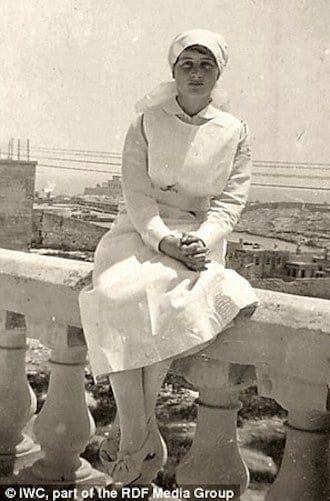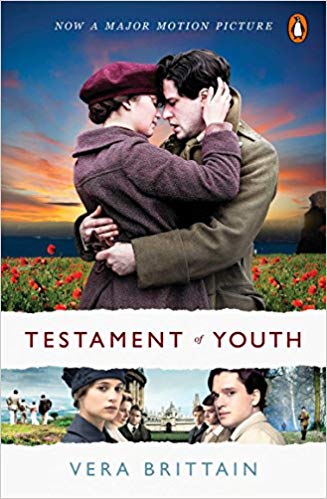
Vera Brittain (December 29, 1893– March 29, 1970) was a British memoirist, poet, essayist, and novelist whose work and life were forever marked by the losses she endured as a result of World War I. She’s best remembered for her classic memoir, Testament of Youth (1933).
As a young wartime nurse, she tended to wounded soldiers in several countries. Her brother and her fiancé were killed during the war. Brittain never fully recovered from the tragic loss, and the horrors of the war are poignantly depicted in her writings.
The suffering she witnessed inspired her to become a pacifist after the war, and she was an active, dedicated member of the peace movement for the rest of her life.
Table Of ContentsVera Brittain was born in the Staffordshire town of Newcastle-under-Lyme. Her parents, Thomas and Edith Brittain, owned paper mills in the towns of Hadley and Cheddleton. The family moved to Macclesfield in the Cheshire area when Vera was 18 months of age, and they lived in Buxton, a spa town, when Vera was aged 11 to 13. At the age of 13, Vera attended St. Monica’s, a boarding school in Surrey. Against her father’s wishes, she majored in English literature at Oxford University, entering at the age of twenty.
While she was an Oxford student in 1915, the university granted her leave to serve as a nurse for those wounded in the war. She was one of the first female students to be granted this type of leave. Serving as a Voluntary Aid Detachment nurse, she cared for soldiers in Buxton and London before being sent to tend to the wounded in Malta and France. Brittain’s fiance, Roland Leighton, was tragically killed shortly before Christmas in 1915. While repairing barbed wire in a no-man’s land late one night, he was shot by a German sniper. Vera’s brother, Edward, was killed in action while serving in Italy in the summer of 1918. Her brother’s close friends, Geoffrey Thurlow and Victor Richardson, also lost their lives during the war. These losses profoundly impacted Brittain, and she would eventually use writing as a vehicle to express her pain. In a 1916 letter to Edward, Vera wrote, “If the war spares me, it will be my one aim to immortalise in a book the story of us four.” She would go on to do just that, and the book, Testament of Youth, became a British classic. . . . . . . . . .

After the war, Vera Brittain returned to Oxford University and changed her major to history. She formed a close friendship with Winifred Holtby and had aspirations of becoming an established author in London. This deep friendship, cut short by Holtby’s untimely death at age 37, was described in this 2013 homage to Brittain and Holtby’s friendship in The Telegraph (U.K.) “As writers they were the most decisive influences on each other’s work. It was a relationship, above all, that made significant contributions to the writing of two bestselling masterpieces, which have stood the test of time: Brittain’s memoir of the cataclysmic effect of the First World War on her generation, Testament of Youth, and Holtby’s South Riding, her novel about a Yorkshire community struggling in the grip of the Great Depression of the Thirties. After Holtby’s death, Brittain memorialized their friendship in a biography of Winifred which, she hoped, would remind people ‘of the glowing, radiant generous, golden creature whom we have lost.’ This friendship has achieved iconic status, as an example of an emotionally and intellectually supportive relationship between two women, of a kind rarely recorded in literature.” . . . . . . . . .

In August 1919, Brittain’s first book of poetry was published. Entitled Verses of a V.A.D., it included a poem dedicated to Edward. The Dark Tide, her first novel, followed in 1923. The work detailed life at Oxford University and was controversial for its discussion of sexism at the institution. Another novel, Anderby Wold, was published that same year.
Vera married the political scientist George Catlin in 1925. The couple had two children. Their son, John, was born in 1927 and became an artist with whom Vera reportedly had a difficult relationship. Shirley, the couple’s daughter, was born in 1930 and became a member of the British parliament.
In 1933, Brittain published her memoir, Testament of Youth. Now recognized as one of the most iconic memoirs of the twentieth century, the work tells of the experiences she endured during World War I. Vera’s fiancee, her brother, and her brother’s friends who died are all prominently featured in the book. Typed on a typewriter in the study at her home in Chelsea, Vera worked on the book for seven hours each day while her young children played. At first she attempted to fictionalize the narrative, but without success. It was only when she let it flow as a memoir that it fell into place. A 2013 homage to Testament of Youth on its eighty year anniversary, The Guardian (U.K.) wrote: “It was only when she decided to write as herself that her authorial voice seemed to flow and the events she had endured were given a poignant immediacy to which readers could relate. In Testament of Youth, the words seemed to pour out of her, a potent mixture of rage and loss, underpinned by lively intelligence and fervent pacifist beliefs.” The book was instantly successful, with all 3,000 printed copies selling out on publication day. Over the next six years, the book sold more than 120,000 copies and earned praise from writer Virginia Woolf, who wrote in her journal that she stayed up all night to finish reading it. After being published in the United States, Testament of Youth was lauded as “heartbreakingly beautiful.”
Testament of Friendship (1940) was a tribute to Vera’s dear friend Winifred Holtby, who passed away in 1935. In 1944, she published Seeds of Chaos, a work that spoke out against World War II. Testament of Experience, another memoir published in 1957, chronicles the years between 1925 to 1950. Brittain was quite a prolific author of nonfiction in addition to her autobiographical series and a smaller number of novels. One of these was a book about Radclyffe Hall‘s trials. A selection of nonfiction works are listed toward the end of this post.
In the 1920s, Brittain was a frequent speaker at events for the League of Nations Union, and she spoke at a peace rally with Dick Sheppard in 1936. In 1937, she joined the Peace Pledge Union and the Anglican Pacifist Fellowship. In the 1930s, she regularly contributed articles to Peace News, a pacifist magazine. After the outbreak of World War II, she wrote a series entitled Letters to Peacelovers and worked as a fire warden. Brittain later became an editorial board member for Peace News, writing articles against colonialism and apartheid.
After being injured in a fall in November 1966, Brittain’s health slowly declined. She passed away in Wimbledon at the age of 76 on March 29, 1970. As requested in her will, Vera’s ashes were scattered over her brother’s grave in Italy. Brittain’s work helped people of later generations understand World War I through her eyes. To this day, her writings inspire others to work for peace. Testament of Youth, her most famous literary contribution, was made into a feature film in 2014. Plaques mark the locations of her former homes in Newcastle-under-Lyme, Buxton, and London, and a promenade in Hamburg, Germany is named for her. . . . . . . . . .

Novels
Nonfiction (highly selected)
More information and sources
Biographies and letters
Film adaptations